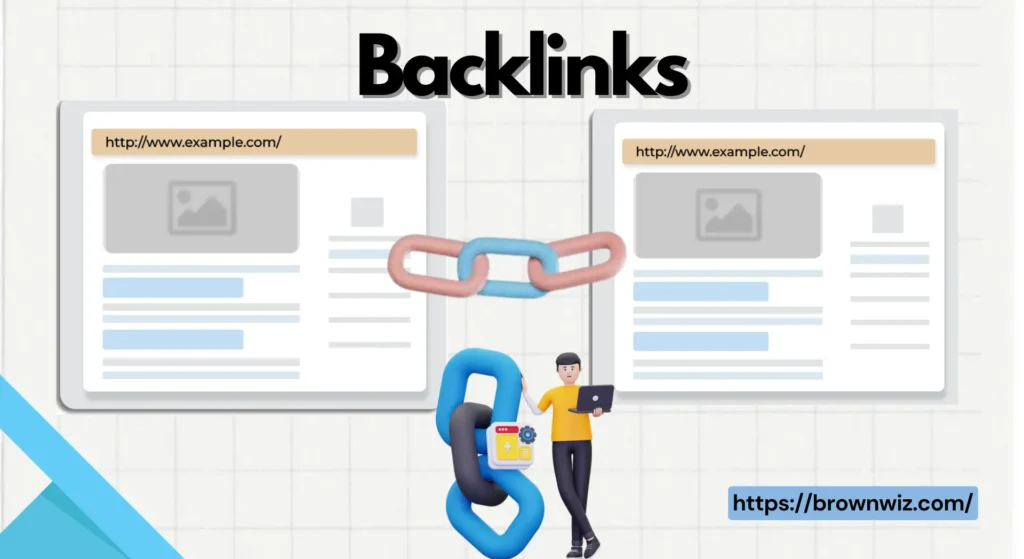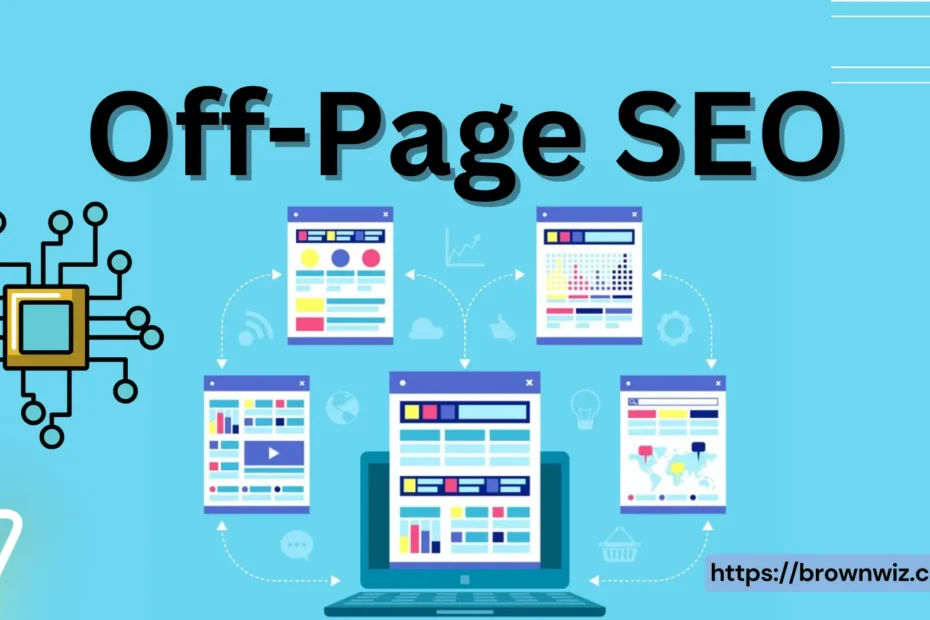Ever wonder how websites get to the top of Google? It’s not just about optimizing your site – you gotta do things outside of your website too. That’s called off-page SEO.
We’re talking about getting quality sites to link to you, getting tons of shares and likes on social media, making sure you show up for local searches, and joining the right online communities.
Definition of Off-Page SEO
Off-page SEO, also known as off-site SEO, refers to the optimization techniques and strategies implemented outside of a website to enhance its visibility, authority, and credibility in search engine results. Think of it as your website’s reputation beyond its borders.
Unlike On-Page SEO, which focuses on optimizing a website’s content and structure, Off-Page SEO involves activities and efforts that build credibility and trust across the web.
Importance of Off-Page SEO in Search Engine Optimization
While On-Page SEO is crucial for ensuring that a website is search engine-friendly and relevant to specific keywords, Off-Page SEO plays a vital role in establishing a website’s reputation, trustworthiness, and authority in the eyes of search engines.
A well-executed Off-Page SEO strategy can significantly improve a website’s search engine rankings, driving more organic traffic and increasing its online visibility.
Why Off-Page SEO Matters
Look, you can have the most beautifully optimized website in the world, but without solid off-page SEO, you’re going nowhere fast in the search rankings. Off-page signals like backlinks and social proof are huge ranking factors that Google uses to determine the quality and relevance of your site.
Types of Link Building
Backlinks
Backlinks, also known as inbound links, are hyperlinks from other websites that point to your website.
These are like little votes of confidence from other websites saying, “Hey, this site’s got some good stuff!” And the more quality backlinks you have, the more search engines trust your site and boost its rankings.
One-way Backlinks
One-way backlinks are links from other websites that point to your website without any reciprocation. These links are considered more valuable in the eyes of search engines as they are seen as genuine endorsements and not part of a link exchange scheme.
Reciprocal Backlinks
Reciprocal backlinks, on the other hand, involve an exchange of links between two websites. While these links can still hold value, they are generally regarded as less impactful than one-way backlinks by search engines.

Types of Links
Not all backlinks are created equal. Different types of backlinks carry varying levels of authority and impact on your website’s search engine rankings.
The Skyscraper Technique
One of the most effective ways to build quality backlinks?
The good ol’ Skyscraper Technique. First, find some linkable content in your niche that has already attracted a bunch of backlinks. Then, create something even better on that same topic. Finally, reach out to the sites linking to that existing content and pitch your superior “skyscraper” piece as a replacement link. It’s a win-win for you and the other site!
Editorial Links
Editorial links, also known as natural links, are obtained organically when other websites find your content valuable and link to it without any explicit request or compensation.
These links are highly prized by search engines as they are considered genuine endorsements of your website’s quality and relevance.
Guest Blogging Links
Writing high-quality guest posts on other sites in your industry is a two-for-one win for off-page SEO.
First, you get exposure to a new audience along with an authoritative backlink from that guest post itself. But perhaps more importantly, guest posting helps build your personal brand while often leading to additional backlink opportunities down the road. It’s an investment that keeps on giving
Resource Links
Here’s a sneaky way to get your content in front of tons of relevant eyeballs – resource link building.
First, create an incredibly valuable resource like a comprehensive guide, expert interview series, or industry study related to your niche. Next, find existing resource pages and hubs that folks in your space frequent. Finally, reach out to the owners of those pages and pitch your resource as a worthy addition. If it’s genuinely useful stuff, they’ll often be happy to link to you as a trusted resource!
Directory Submission Links
Directory submission links are obtained by listing your website in online directories or business listings. While these links can be beneficial for local SEO and visibility, it’s important to focus on high-quality, relevant directories rather than indiscriminate submissions, as low-quality directory links can potentially harm your search engine rankings.
Link Building Strategies
Effective link-building requires a strategic approach and a combination of various tactics.
Well let’s find them out
Content Marketing

Ah, content – the lifeblood of the internet. But did you know it’s also crucial for Off-Page SEO?
Yup, creating valuable, shareable content isn’t just about engaging your audience – it’s about earning those precious backlinks and social shares that boost your site’s authority and relevance in the eyes of search engines.
This can include blog posts, infographics, videos, whitepapers, and other forms of content that provide value to your target audience.
So, next time you’re crafting that killer blog post, think about how it can help your Off-Page SEO game too
Outreach and Relationship Building
Building relationships with other website owners, influencers, and industry professionals can open doors to valuable backlink opportunities.
Through outreach campaigns, you can collaborate on content creation, guest blogging, or secure mentions and links from relevant and authoritative websites.
Broken Link Building
Broken link building involves identifying broken or outdated links on other websites and reaching out to the website owners with suggestions for replacing those links with relevant and valuable content from your website.
This strategy can be mutually beneficial, as it helps other websites improve their content while providing you with high-quality backlinks.
Link Reclamation
Link reclamation involves identifying and recovering lost or broken backlinks that once pointed to your website.
By monitoring and auditing your backlink profile, you can identify these lost links and reach out to the website owners to request that they update or replace the broken links with fresh, working links to your website.
Social Media Marketing

Ever noticed how social media seems to be everywhere these days?
Well, it’s not just for keeping up with your friends – it’s also a goldmine for Off-Page SEO. Social signals, like shares, likes, and comments, send signals to search engines that your content is popular and worth showing to others.
Importance of Social Media in Off-Page SEO
Social media plays a significant role in Off-Page SEO by providing platforms for content distribution, brand promotion, and engagement with your target audience.
While social signals (likes, shares, comments) may not directly impact search engine rankings, they can indirectly influence Off-Page SEO by driving referral traffic, increasing brand visibility, and fostering community engagement.
Social Media Platforms
There are various social media platforms that can be leveraged for Off-Page SEO efforts, each with its unique strengths and audience.
With billions of active users, Facebook offers a vast platform for content sharing, community building, and targeted advertising.
Businesses can create engaging posts, run social media campaigns, and leverage Facebook groups to connect with their target audience.
X (Formerly Twitter)
Twitter’s real-time nature and the ability to engage in conversations make it an ideal platform for sharing news, and updates, and engaging with industry influencers and thought leaders. Building a strong Twitter presence and leveraging hashtags can increase brand visibility and drive referral traffic.
LinkedIn is a professional networking platform that provides opportunities for businesses to connect with industry professionals, establish thought leadership, and share relevant content with their target audience. Building a company page and engaging with relevant groups can enhance brand visibility and credibility.
Instagram’s visual nature and growing popularity make it an attractive platform for businesses to showcase their products, services, and brand personality. Leveraging hashtags, user-generated content, and influencer collaborations can help businesses increase their reach and engagement.
Social Media Marketing Tactics
Effective social media marketing for Off-Page SEO involves implementing various tactics to maximize visibility, engagement, and referral traffic.
Content Sharing
Regularly sharing valuable and engaging content on social media platforms can help increase brand visibility, drive referral traffic, and encourage social sharing and engagement. This can include blog posts, infographics, videos, or other forms of content that resonate with your target audience.
Influencer Marketing
Collaborating with industry influencers or thought leaders who have established followings can help businesses tap into new audiences and increase their credibility. Influencer marketing campaigns can involve sponsored content, product reviews, or co-created content that leverages the influencer’s authority and reach.
Social Media Advertising
Social media platforms offer robust advertising capabilities that allow businesses to target specific audiences based on demographics, interests, and behaviors.
Paid social media advertising can be an effective way to increase brand awareness, drive website traffic, and promote specific content or campaigns.
Local SEO And Off-Page
If you’re running a local business, Off-Page SEO can be your ticket to the top of the local search results. Local citations, like listings in online directories, can help boost your visibility in your area.
And don’t forget about optimizing your Google My Business listing – it’s like the digital storefront for your brick-and-mortar shop.
Importance of Local SEO
For businesses that operate locally or serve specific geographic areas, Local SEO is crucial for increasing visibility and attracting customers from their target regions. By optimizing for local search results, businesses can improve their chances of appearing in relevant search queries and capturing local customers.
Optimizing Google My Business
The first step to mastering local SEO? Claiming and optimizing your Google My Business listing to a tee. That includes ensuring your NAP (name, address, phone number) details are 100% consistent and accurate, choosing the proper business categories, uploading high-res photos, and keeping your listing fresh with new posts and offers. This legitimizes your business with Google while helping your local search visibility immensely.
Local Listings and Citations
Local listings and citations refer to the online directories and platforms where businesses can list their business information, such as name, address, phone number, and website URL. Ensuring accurate and consistent listings across various directories (e.g., Google My Business, Bing Places, Yelp, and industry-specific directories) can improve local search visibility and rankings.
Getting Customer Reviews
Online reviews are an often overlooked but hugely impactful local SEO factor too. Google takes reviews into account when determining local rankings, while positive reviews help attract more customers and clicks to your listing.
So make it a point to actively solicit feedback from happy clients and customers, responding promptly to all reviews (positive or negative) to show you’re on top of your online reputation.
Local Link Building
Link-building efforts specifically targeted at acquiring backlinks from local and relevant websites can boost a business’s Local SEO performance. This can include securing links from local directories, chambers of commerce, local blogs, and community websites, as well as sponsoring or participating in local events and organizations.
Brand Mentions and PR/ Online Reputation Management
Your online reputation matters more than you might think when it comes to Off-Page SEO.
Positive reviews, mentions, and testimonials can work wonders for your site’s credibility and trustworthiness, while negative feedback can drag you down faster than you can say “Google it.” That’s why managing your online reputation is crucial for maintaining a strong Off-Page SEO presence.
Importance of Brand Mentions
Brand mentions refer to instances where a business’s name, products, or services are mentioned on other websites or online platforms without an explicit link. These brand mentions can contribute to Off-Page SEO by increasing brand awareness, building credibility, and potentially leading to future backlink opportunities.
Public Relations (PR)
Public relations (PR) efforts can play a significant role in securing brand mentions and backlinks through various channels, such as press releases, media outreach, and influencer collaborations.
By creating newsworthy stories, engaging with journalists and industry influencers, and leveraging media relations, businesses can increase their online visibility and attract valuable brand mentions and backlinks.
Brand Monitoring
Monitoring brand mentions across the web is crucial for identifying potential backlink opportunities, addressing any negative sentiment or misinformation, and engaging with customers and industry professionals.
Tools like Google Alerts, mention.net, and social media monitoring platforms can help businesses stay informed about brand mentions and take appropriate action.
Influencer Outreach
Collaborating with industry influencers or thought leaders can also contribute to brand mentions and backlinks.
By establishing relationships with influencers and providing them with valuable content, products, or experiences, businesses can increase their chances of being mentioned or featured on the influencer’s platforms, potentially leading to backlinks and increased brand exposure.
Forums and Communities
Forums and online communities centered around your industry or interests can be an absolute goldmine for off-page optimization and audience-building.
Not only are active forums a prime place to interact directly with your target customers, but they’re also chock-full of backlinks and mention opportunities waiting to be tapped into.
Importance of Forums and Communities
Online forums and communities provide platforms for individuals with shared interests or industries to connect, share information, and engage in discussions. By actively participating in relevant forums and communities, businesses can establish themselves as authorities in their field, build relationships, and potentially secure backlinks.
Identifying Relevant Forums and Communities
Identifying the most relevant and active forums and communities in your industry or niche is crucial for maximizing the impact of your participation. This can involve researching popular forums, industry-specific communities, and social media groups related to your business or product offerings.
Engaging with the Community
Once you have identified relevant forums and communities, it’s important to engage in a meaningful and authentic way. This can involve answering questions, participating in discussions, sharing valuable insights and resources, and providing helpful advice or solutions to community members’ problems.
Forum and Community Link Building
While direct link-building efforts within forums and communities should be approached with caution to avoid being perceived as spammy, there are opportunities to naturally acquire backlinks through your valuable contributions and established presence. This can include creating informative and well-researched guides, sharing unique resources, or offering exclusive content that other members find valuable enough to link to.
Measuring Off-Page SEO Success
Okay, so you’ve been putting in the work on your Off-Page SEO, but how do you know if it’s paying off?
That’s where metrics come in. Tracking things like domain authority, backlink profile, and social media engagement can give you valuable insights into how well your Off-Page SEO efforts are performing. And with the right tools, like Google Analytics, you can keep a close eye on your progress and make adjustments as needed.
Recap of Off-Page SEO Strategies
Off-page SEO encompasses a wide range of strategies and tactics, including link building, social media marketing, local SEO, brand mentions and PR, and engaging with forums and communities. Each of these elements plays a crucial role in establishing a website’s authority, credibility, and online visibility, ultimately contributing to improved search engine rankings and increased organic traffic.
Importance of a Well-Rounded SEO Strategy
While Off-Page SEO is a vital component of a successful SEO strategy, it should be combined with effective On-Page SEO techniques for optimal results.
A well-rounded and comprehensive approach that incorporates both on-page and off-page optimization efforts is essential for achieving long-term success in the ever-evolving landscape of search engine optimization.
Phew, we’ve covered a lot of ground here, haven’t we?
But the bottom line is this – Off-Page SEO is essential for anyone looking to make their mark in the digital world. By understanding its ins and outs and implementing effective strategies, you can boost your website
